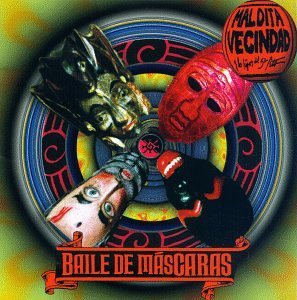Happy Friday From Maldita Vecindad!
 If you haven’t heard of Maldita Vecindad, I feel sorry for you, but I’m going to break it down for you right quick. First, their entire name is La Maldita Vecindad y los Hijos del Quinto Patio and they formed in Mexico City in the 1980s. I found them in the 1990s and have been obsessively listening to their 1996 album, Baile de Máscaras, recently.
If you haven’t heard of Maldita Vecindad, I feel sorry for you, but I’m going to break it down for you right quick. First, their entire name is La Maldita Vecindad y los Hijos del Quinto Patio and they formed in Mexico City in the 1980s. I found them in the 1990s and have been obsessively listening to their 1996 album, Baile de Máscaras, recently.
When I say “obsessively,” I mean that it was the only tape I listened to in my car (yes I have a tape deck in my car) for most of 2011. As the tape begins to wear out, what I’ve realized is that this album is brilliant for many reasons, principal among them is the chronicling of a pre-NAFTA Mexico, beginning to grapple with the post-NAFTA Mexico, and what the world would be like for Mexico moving into the 21st century.
Now I know that sounds fancy, but hear me out. A song like “Salta pa’trás” for example, that re-examines the weird racial caste system used by the Spaniards in Mexico dig away at the absurdity of racial labels in one of the largest and most diverse cities in the world (Mexico City). The song consists of chants of these labels “mestizo con blanca, china con lobo, india con negra,” and you get the picture; the chant seems kind of desperate when sung, and ultimately, the song concludes that there is no such thing as purity — a point made both about race, but also I think we can deduce, about our society in a globalized world. This is further underscored by the repeated use of indigenously stylized chants or melodies used in the hidden track at the end, but also throughout the album.
“El Chulo” is about a guy who fancies himself dapper, but who’s actually dating a stripper. Then the closing tid bit of the song is, “El miedo no cabe, se va a la tiznada,” which basically means you never stop being afraid, fear just evaporates into the ether. Again, if we think about Mexico City in the context of the mid 1990s, as the U.S. and globalization was taking over, this song is almost about the nation of Mexico as it transitions from a more predictable life, to one in which fear is set to dissipate a la tiznada.
Similarly, “Por Ahí” talks about progress and modernization:
“No Les Creo Nada,” is probably the most obviously political song on the album, the chorus is “Mienten mucho, no les creo nada,” which translates to, “They lie a lot, I don’t believe them at all,” referring to the news media specifically, but generally to the political system in Mexico. The song talks about how the mainstream discussion of things in Mexico is fine, but in a sarcastic tone, enter the chorus, and you get the picture that it’s frustrating having to live on reality in your life, and then see the fictionalized version of it on TV.
And the last song that I’ll talk about on this album is “Don Palabras,” which ostensibly tells the story of a guy the singer meets, but seems to be really about Mexico as a society. The chorus is, “Miles de historias. En cada barrio,” which translates to “Thousands of stories in every neighborhood.” Urgency is added to the song with a saxophone, and the lyrics are sung with a sense of tragedy that culture is being lost. That these stories that used to be told, that poetry itself, is being lost in the vastness of Mexico City.
And the final reason you should check this band and this album out is: they’re awesome! Happy Friday!
[Videos By neonzik; neonzik; neonzik; guevaraexito; malditavecindadtv]
